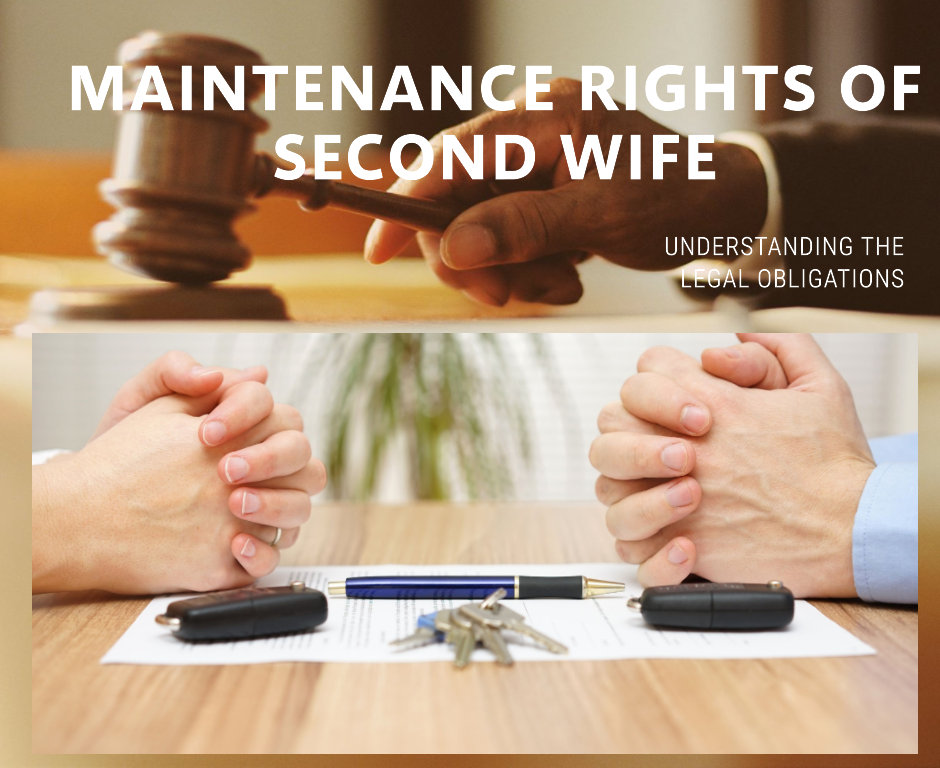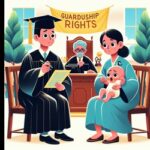In a recent legal pronouncement by Justice Rajesh S. Patil, the Bombay High Court has reaffirmed a significant principle: the obligation of a man to provide maintenance to his second wife, especially when the latter is unaware of his existing marriage to another woman. This landmark judgment sheds light on the nuances of Section 125 of the Criminal Procedure Code (Cr.P.C), which deals with the maintenance of wives, children, and parents. Let’s delve into the intricacies of the case and the implications it carries in the corridors of justice.

Facts and Background:
The Petitioner on 20 December 2012, filed a Criminal Application No. 444 of 2012 under Section 125 of the Code of Criminal Procedure,1973 (for short “Cr.P.C.”) for grant of maintenance before the J.M.F.C., Yeola, from the Respondent/Husband.
It was pleaded by the Petitioner before the J.M.F.C. that she is the second wife of the Respondent, and her marriage
took place with the Respondent in the year 1989. It was further stated that she was made to believe that the first wife of the Respondent not cohabiting with him properly and as the first wife was not able to conceive a male child, the Respondent got divorced from her. Relying on the words of the Respondent, the Petitioner got married to the Respondent.
It is further the case of the Petitioner that on 3 September 1991, she gave birth to a male child who was conceived with the Respondent. After one or two years of her marriage, the first wife of the Respondent requested the Respondent through mediators to allow her to cohabit with him, and through the intervention, the Petitioner herself gave consent to the Respondent to allow the first wife to reside with them jointly. Thereafter, the Petitioner gave birth to another male child, while the first wife also gave birth to a male child.
Respondent started Harassing the Petitioner/Second Wife
It is further case of Petitioner that the Respondent immediately thereafter started harassing the Petitioner. The
Petitioner was subjected to various abuses and physical beating at the hands of the Respondent and ultimately, she was sent to her parental home. Subsequently, due to the intervention of members of the community, there was a mutual understanding between the Petitioner and Respondent, pursuant to which, the Petitioner started residing separately along with her children in the same village. The Respondent started paying maintenance amount to the Petitioner, which continued till the year 2011, but, since 2011 at the instigation of the first wife, the Respondent stopped paying maintenance to the Petitioner and he also stopped visiting the house of the Petitioner. Also, the Respondent abused the children conceived with the Petitioner
and also threatened them not to demand any maintenance amount. It was also further submitted by the Petitioner that Respondent was having good income as he was the owner of irrigated agricultural land, and also had a milk business. He was also a contractor for digging wells; and as such his monthly income is around Rupees fifty to sixty thousand, therefore, the Petitioner claimed a sum of Rs.5,000/- per month from the Respondent.
The Respondent/Husband filed his reply
The Respondent/Husband filed his reply to the maintenance application filed by the Petitioner. The Respondent
denied the contention of the Petitioner. He stated that he never married the Petitioner and as per his contention he got married to his first wife on 12 March 1981 and the said marriage was still in existence and he had never divorced his first wife. The Respondent further stated that he never resided with the Petitioner, and he has no concern with the children of the Petitioner, whatsoever.
The Petitioner examined herself and reiterated the statement made by her in her pleadings. She also stated that if
necessary, she was ready to undergo a DNA test to prove that her children were begotten from the Respondent. The Petitioner also examined her two sons as Witness No.2 and Witness No.3. The Leaving Certificate of Witness No.2 as well as the Final Marksheet of Std. 12th of Witness No.3 was produced on record to prove that Respondent No.1 is the father of Witness Nos.2 and 3. So also, one, who arranged the marriage of Petitioner and Respondent, was also examined as a witness on behalf of the Petitioner. One more witness, More was examined as Witness No.5 to prove that the Petitioner was residing with the Respondent. Whereas the Respondent examined himself and also his first wife and one of his relatives. In order to prove that he had not married Petitioner.
J.M.F.C., Yeola Court Order
Subsequently, the J.M.F.C., Yeola, after hearing both the parties and after considering the evidence and documents on record, by its Order dated 19 January 2015, granted the Petitioner maintenance of Rs.2,500/- per month, from the date of the filing of the Application by her and Rs.1,000/- for the cost of the Application.
Order passed by the J.M.F.C., Yeola in favor of Second Wife is Challenged by the Respondent
The Order passed by the J.M.F.C., Yeola, dated 19 January 2015 was challenged by the Respondent/Husband by way of Criminal Revision Application No.11 of 2015. The Revision Court, by its Judgment and Order dated 21 April 2022, set aside the Judgment and Order dated 19 January 2015 passed by the J.M.F.C. Yeola and allowed the Revision Application of the Husband.
Second Wife Challenges the Impugned Judgment
Petitioner/wife, by present Criminal Writ Petition, challenges the impugned Judgment & Order dated 21 April 2022 passed by the Revision Court / Sessions Court.
Submissions by Second Wife/Petitioner Advocate
The Respondent Advocate responded to the petitioner’s claims, stating that the Revision Court rightly considered relevant legal principles. He pointed to the Supreme Court’s settled decision in Chanmuniya v/s. Virender Kumar Singh Kushwaha (2011) 1 SCC 141, emphasizing that there’s no need for further examination of issues already addressed by the highest court.
Highlighting the petitioner’s alleged uncertainty and shifts in testimony, the Respondent Advocate urged the court to disregard her evidence. He backed his argument with references to legal precedents like D. Velusamy v/s. D Patchaiammal (2010) 10 SCC 469, Lalita Toppo v/s. State of Jharkhand (2019) 13 SCC 796, Bhagwandas v/s. Panpati Shah (2023) SCC Online MP 1325, Smt. Yamunabai v/s. Anantrao Shivram Adhav (1988) 1 SCC 530, and Bakulabai v/s. Gangaram (1988) 1 SCC 537.
The Respondent Advocate firmly stated that the petition lacks merit. Urging the court to dismiss it based on the arguments presented and established legal precedents.
Respondent Advocate Submission
Responding to the petitioner’s advocate, the respondent’s legal representative argued that the Revision Court appropriately considered relevant legal principles, leading to the justified setting aside of the J.M.F.C.’s order. Referring to legal precedents, particularly Chanmuniya v/s. Virender Kumar Singh Kushwaha (2011) 1 SCC 141, the respondent’s advocate asserted that the court has settled the legal issues at hand. Eliminating the need for further scrutiny.
Highlighting the petitioner’s alleged uncertainty and contradictory testimony, the respondent’s advocate urged the court to disregard the petitioner’s evidence. The advocate further supported their stance with references to legal judgments, including D. Velusamy v/s. D Patchaiammal (2010) 10 SCC 469, Lalita Toppo v/s. State of Jharkhand (2019) 13 SCC 796, Bhagwandas v/s. Panpati Shah (2023) SCC Online MP 1325, Smt. Yamunabai v/s. Anantrao Shivram Adhav (1988) 1 SCC 530, and Bakulabai v/s. Gangaram (1988) 1 SCC 537.
In conclusion, the respondent’s advocate urged the court to dismiss the petition, citing lack of merit and legal precedent.
Justice Rajesh S. Patil Opinion:
“I am of the opinion as held in Dwarika Prasad Satpathy Vs. Bidyut Prava Dixit reported in (1999) 7 SCC 675, atleast for the purpose of Section 125 of Cr.P.C. Petitioner would be treated as the ‘wife’ of the Respondent.”
In the present proceedings the issue is only with regard to the Petitioner, who has claimed maintenance as wife and not for her sons, therefore the case of the Respondent that son of the petitioner was born before the alleged date of marriage, will not make much of a difference.
Burden of Proof and Marital Status
The analysis extends to the burden of proof in Section 125 Cr.P.C cases. Drawing from Dwarika Prasad Satpathy, the judgment clarifies the standard of proof, not as stringent as in criminal trials. If the claimant shows cohabitation, the court can presume a legal marriage. Thus the burden to prove marriage’s invalidity lies with the husband, aligning with Section 125 Cr.P.C to prevent vagrancy.
Verdict: A Definitive Stand for Maintenance
Taking a decisive stance, Undoubtedly, Justice Patil affirms the petitioner’s entitlement to maintenance as the second wife.
Hence, taking into consideration the above facts, Rule is made absolute. The Judgment and Order dated 21 April 2022, passed by Sessions Judge Niphad is quashed and set aside. The Judgment and Order dated 19 January 2015, passed by the J.M.F.C., Yeola, is confirmed.
Respondent (husband) is granted two months time to clear the outstanding maintenance amount. Since 9 years have passed after the passing of Order by J.M.F.C. Yeola, Furthermore it is mentioned in the judgment that. The Petitioner is at liberty to file fresh Application for enhancement of maintenance amount. If such Application is preferred, same should be decided on its own merits.
Conclusion: Upholding Justice and Equity
In conclusion, Justice Rajesh S. Patil’s judgment emerges as a beacon of justice and equity. Meticulously unraveling Section 125 Cr.P.C, the court ensures a man can’t evade maintenance obligations by concealing his first marriage. This purposive interpretation aligns seamlessly with the constitutional vision, distinctly underscoring the court’s pivotal role in advancing social justice. This ruling extends beyond the case, shaping matrimonial jurisprudence, robustly reinforcing fairness, equality, and justice principles.


Leave a Reply